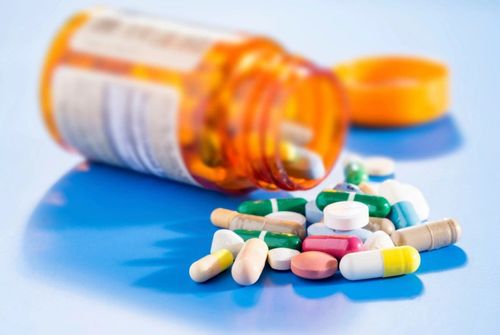This is an automatically translated article.
Nirdicin 250mg is a product of Pharmathen S.A company with the packing specification of 1 blister x 10 film-coated tablets in each box. So what is Nirdicin 250mg and what does Nirdicin 250mg do?
1. What is Nirdicin 250mg?
Ingredients in each Nirdicin 250mg tablet include:
Levofloxacin antibiotic (in the form of Levofloxacin hemihydrate) 250mg; Some excipients are just enough for 1 tablet.
2. What are the effects of Nirdicin?
What are the uses of Nirdicin 250mg? The use of the drug Nirdicin 250mg is the use of the antibiotic Levofloxacin:This is a synthetic antibiotic belonging to the Fluoroquinolone group; The bactericidal effect of Nirdicin 250mg is due to inhibition of topoisomerase II or IV, an enzyme that helps bacteria to multiply; It should be noted that there is cross-resistance between fluoroquinolone antibiotics and other antibiotics. Indications of the drug Nirdicin 250mg : This product is indicated for patients diagnosed with infections caused by specific strains of bacteria susceptible to Levofloxacin as follows :
Community acquired pneumonia ; Skin and soft tissue infections; Chronic prostatitis; Complicated urinary tract infections such as pyelonephritis; Uncomplicated urinary tract infections; Acute sinusitis ; Acute exacerbation of chronic bronchitis.
3. Instructions on how to use Nirdicin 250mg
Nirdicin 250mg medicinal product is for oral use only. The patient should swallow the tablet whole with a sufficient amount of water, do not chew or crush the tablet. Product Nirdicin 250mg can be broken according to the manufacturer's dosing line, the best time to use is during meals or between two meals.
Dosage of Nirdicin 250mg drug should follow the doctor's prescription or refer to the recommended dose as follows:
Community-acquired pneumonia: 2 Nirdicin 250mg tablets each time, taken 1-2 times a day for a period of 7-14 days; Skin and soft tissue infections: 1-2 Nirdicin 250mg tablets each time, 1-2 times/day for 1-2 weeks; Chronic prostatitis: 2 Nirdicin 250mg tablets orally once daily for 28 days; Complicated urinary tract infections such as pyelonephritis: 1 Nirdicin 250mg tablet orally once daily for 10 days; Uncomplicated urinary tract infections: 1 Nirdicin 250mg tablet once daily for 3 days; Acute sinusitis: 2 Nirdicin 250mg tablets orally once daily for 10-14 days; Acute exacerbation of chronic bronchitis: 1-2 tablets of Nirdicin 250mg orally once a day for 7-10 days; Dosage of Nirdicin 250mg for patients with renal failure should be adjusted according to creatinine clearance. How to deal with missed dose, overdose:
When forgetting to use Nirdicin 250mg, patients should take it again as soon as they remember. However, patients should skip the missed dose if it is almost time for the next dose. Absolutely do not double the dose of Nirdicin 250mg prescribed; Symptoms of Nirdicin 250mg overdose include tinnitus, confusion, cognitive disturbances, prolongation of the QT interval, and epileptic seizures. Some cases have gastrointestinal disorders such as nausea or erosion of the gastrointestinal mucosa. If an overdose and serious side effects appear of Nirdicin 250mg, the patient should immediately go to the hospital for timely treatment by a doctor.
4. Contraindications of Nirdicin 250mg
Contraindications of Nirdicin 250mg drug in the following cases:
People with a history of allergy or hypersensitivity to Levofloxacin, other fluoroquinolones and any ingredients in the formula Nirdicin 250mg; The patient has a history of epilepsy or is currently having seizures; People with G6PD deficiency; Nirdicin 250mg is contraindicated in pregnant or lactating women and children under 18 years of age; The patient has a history of tendon pain caused by the use of fluoroquinolones.
5. Undesirable effects of Nirdicin 250mg
The side effects reported when using Nirdicin 250mg are as follows:
Common: loose diarrhea, nausea, increased liver enzymes, headache, insomnia; Uncommon: nervous tension, dizziness, mental agitation; Constipation, vomiting, abdominal pain, flatulence, indigestion; Hyperbilirubinemia, vaginitis or genital candidiasis; Skin rash with itching; Rare: Arrhythmia, changes in blood pressure; Pseudomembranous colitis, gastritis; Dry mouth, swollen tongue; Muscle pain, weakness, joint pain, Achilles tendonitis; Osteomyelitis ; Depression, abnormal dreams, seizures, psychosis; Anaphylaxis, Quincke's edema, Lyell or Steven-Johnson syndrome. If any side effects appear during the use of Nirdicin 250mg, the patient should immediately notify the doctor or pharmacist for timely treatment.
6. Interactions of Nirdicin 250mg
Several drug interactions have been reported in association with the Nirdicin 250mg product, including:
Preparations containing divalent and trivalent cations such as iron salts, antacids containing aluminum or magnesium which may decrease drug absorption Nirdicin 250mg should be taken at least 2 hours apart; Sucralfate: The bioavailability of Nirdicin 250mg is reduced, therefore patients should take Sucralfate at least 2 hours after this product; Drugs affecting the renal excretion of Levofloxacin such as Cimetidine, Probenecid, especially in patients with renal failure need special caution when combined; Vitamin K antagonists, when used with Nirdicin 250mg, can increase blood clotting time and bleeding. To ensure safety and effectiveness, patients should tell their doctor about all medications, health foods they are taking and other illnesses they have before starting treatment with Nirdicin 250mg.
7. Some notes when using Nirdicin 250mg
Animal reproduction studies have shown that Nirdicin 250mg may cause some negative effects on the unborn baby, however this has not been adequately and adequately studied in humans. At the same time, Nirdicin 250mg can also be excreted into tamarind milk. Therefore, do not use Nirdicin 250mg for these 2 special groups of subjects.
Dizziness, tinnitus, drowsiness, visual disturbances of Nirdicin 250mg may affect the patient's ability to drive and use machines, so it should be used with caution in this case. .
In addition, during the use of Nirdicin 250mg, it is necessary to note some of the following side effects:
Tendonitis or tendon rupture, joint pain, muscle pain...; Diarrhea, possibly due to pseudomembranous colitis and requiring appropriate intervention; Hypoglycemia, especially in diabetic patients treated with oral glycemic control drugs; Due to increased sensitivity to light, patients taking Nirdicin 250mg should not expose their skin to sunlight or artificial ultraviolet rays. Nirdicin 250mg should be used with caution in the following subjects:
Patients with renal failure need to adjust the dose of Nirdicin 250mg appropriately; Patients with pre-existing prolongation of the QT interval on the ECG should be used with caution when taking Nirdicin 250mg. Nirdicin 250mg is a product of Pharmathen S.A company with the packing specification of 1 blister x 10 film-coated tablets in each box. The drug is indicated in certain infectious diseases. To ensure effective treatment and avoid unwanted side effects, patients need to take the drug exactly as directed by a doctor or pharmacist.
Follow Vinmec International General Hospital website to get more health, nutrition and beauty information to protect the health of yourself and your loved ones in your family.
Please dial HOTLINE for more information or register for an appointment HERE. Download MyVinmec app to make appointments faster and to manage your bookings easily.













